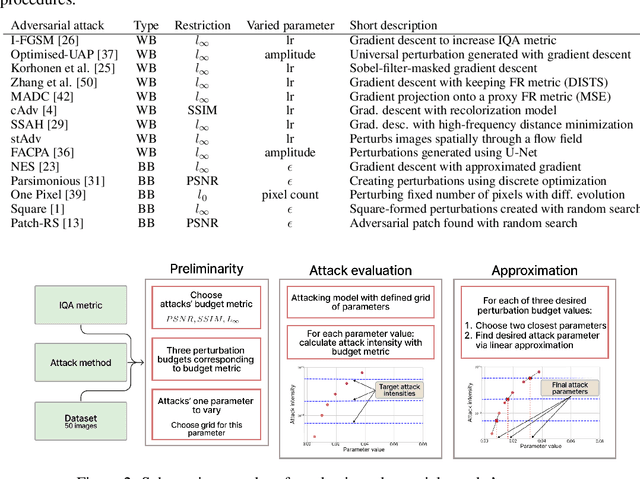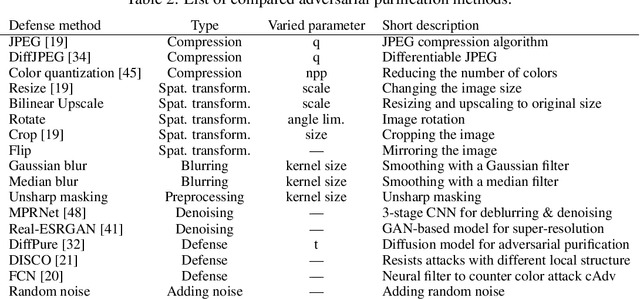Khaled Abud
NIC-RobustBench: A Comprehensive Open-Source Toolkit for Neural Image Compression and Robustness Analysis
Jun 23, 2025Abstract:Adversarial robustness of neural networks is an increasingly important area of research, combining studies on computer vision models, large language models (LLMs), and others. With the release of JPEG AI -- the first standard for end-to-end neural image compression (NIC) methods -- the question of evaluating NIC robustness has become critically significant. However, previous research has been limited to a narrow range of codecs and attacks. To address this, we present \textbf{NIC-RobustBench}, the first open-source framework to evaluate NIC robustness and adversarial defenses' efficiency, in addition to comparing Rate-Distortion (RD) performance. The framework includes the largest number of codecs among all known NIC libraries and is easily scalable. The paper demonstrates a comprehensive overview of the NIC-RobustBench framework and employs it to analyze NIC robustness. Our code is available online at https://github.com/msu-video-group/NIC-RobustBench.
IQA-Adapter: Exploring Knowledge Transfer from Image Quality Assessment to Diffusion-based Generative Models
Dec 02, 2024



Abstract:Diffusion-based models have recently transformed conditional image generation, achieving unprecedented fidelity in generating photorealistic and semantically accurate images. However, consistently generating high-quality images remains challenging, partly due to the lack of mechanisms for conditioning outputs on perceptual quality. In this work, we propose methods to integrate image quality assessment (IQA) models into diffusion-based generators, enabling quality-aware image generation. First, we experiment with gradient-based guidance to optimize image quality directly and show this approach has limited generalizability. To address this, we introduce IQA-Adapter, a novel architecture that conditions generation on target quality levels by learning the relationship between images and quality scores. When conditioned on high target quality, IQA-Adapter shifts the distribution of generated images towards a higher-quality subdomain. This approach achieves up to a 10% improvement across multiple objective metrics, as confirmed by a subjective study, while preserving generative diversity and content. Additionally, IQA-Adapter can be used inversely as a degradation model, generating progressively more distorted images when conditioned on lower quality scores. Our quality-aware methods also provide insights into the adversarial robustness of IQA models, underscoring the potential of quality conditioning in generative modeling and the importance of robust IQA methods.
Exploring adversarial robustness of JPEG AI: methodology, comparison and new methods
Nov 18, 2024



Abstract:Adversarial robustness of neural networks is an increasingly important area of research, combining studies on computer vision models, large language models (LLMs), and others. With the release of JPEG AI - the first standard for end-to-end neural image compression (NIC) methods - the question of its robustness has become critically significant. JPEG AI is among the first international, real-world applications of neural-network-based models to be embedded in consumer devices. However, research on NIC robustness has been limited to open-source codecs and a narrow range of attacks. This paper proposes a new methodology for measuring NIC robustness to adversarial attacks. We present the first large-scale evaluation of JPEG AI's robustness, comparing it with other NIC models. Our evaluation results and code are publicly available online (link is hidden for a blind review).
Guardians of Image Quality: Benchmarking Defenses Against Adversarial Attacks on Image Quality Metrics
Aug 02, 2024



Abstract:In the field of Image Quality Assessment (IQA), the adversarial robustness of the metrics poses a critical concern. This paper presents a comprehensive benchmarking study of various defense mechanisms in response to the rise in adversarial attacks on IQA. We systematically evaluate 25 defense strategies, including adversarial purification, adversarial training, and certified robustness methods. We applied 14 adversarial attack algorithms of various types in both non-adaptive and adaptive settings and tested these defenses against them. We analyze the differences between defenses and their applicability to IQA tasks, considering that they should preserve IQA scores and image quality. The proposed benchmark aims to guide future developments and accepts submissions of new methods, with the latest results available online: https://videoprocessing.ai/benchmarks/iqa-defenses.html.
Comparing the robustness of modern no-reference image- and video-quality metrics to adversarial attacks
Oct 10, 2023Abstract:Nowadays neural-network-based image- and video-quality metrics show better performance compared to traditional methods. However, they also became more vulnerable to adversarial attacks that increase metrics' scores without improving visual quality. The existing benchmarks of quality metrics compare their performance in terms of correlation with subjective quality and calculation time. However, the adversarial robustness of image-quality metrics is also an area worth researching. In this paper, we analyse modern metrics' robustness to different adversarial attacks. We adopted adversarial attacks from computer vision tasks and compared attacks' efficiency against 15 no-reference image/video-quality metrics. Some metrics showed high resistance to adversarial attacks which makes their usage in benchmarks safer than vulnerable metrics. The benchmark accepts new metrics submissions for researchers who want to make their metrics more robust to attacks or to find such metrics for their needs. Try our benchmark using pip install robustness-benchmark.
 Add to Chrome
Add to Chrome Add to Firefox
Add to Firefox Add to Edge
Add to Edge